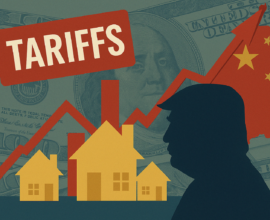What is a Real Estate Syndication & How Does it Work?
Real estate syndication can bring a group of people from different backgrounds and financial positions together to invest in real estate, creating a win-win situation for all involved. Syndications are an advanced strategy for real estate investing.
What Is a Real Estate Syndication?
Simply put, it is a group of investors who pool their money together for the purpose of buying a real estate investment.
Every syndicate is unique in its goals and strategies, and there are many different approaches to putting one together. There can be just three in a syndication or three thousand!
The syndicate may invest in running an apartment complex, flipping condominiums and homes, buying land and building homes on it, or purchasing a bunch of single-family homes and renting them out for passive income. The possibilities are endless and can be very lucrative!
A real estate syndication is made up of two groups of individuals: general partners and limited partners. General partners (GPs) are those who run the operation of the syndicate. The GPs actively hunt for deals to bring to the table.
They tour the properties, make offers, and deal with the paperwork, admin, and accounting. They raise the capital required and make all the decisions involved in the project, past, present, and future. The GPs are ultimately responsible for the success or (hopefully not) failure of the investment, as well as legally responsible for managing the syndication.
Limited partners (LPs) are the individuals who put up their money for the investment. They are known as “limited” not only due to their limited role in the everyday direction of the investment, but primarily because their legal liability in the investment is generally limited to the funds they put in. As they are not actively running the investment, LPs typically cannot be sued if the investment fails. They may lose their funds if things go wrong but nothing more than that.
In many syndications, the LPs don’t put ALL of the money in for the purchase of the property or land. Instead, they generally provide the down payment and rehab costs. If the syndicate takes a bank loan, then they may also use the funds for closing costs.
Every syndication gets to decide for themselves the percentage split between the LPs and GPs. Many follow a 70/30 split — the LPs get 70% of the profit and the GPs receive 30%. There are of course variations to the split. Don’t forget many GPs have “skin in the game” too, meaning they invest their own personal funds.
Real Estate Syndication Fees
In addition to sharing profits, the GP earns additional income in the form of “fees.” Fees for the GP serve a very important role in the syndication as they provide an immediate reward as well as working capital for the general partners.
In most syndications, most of the profit is made at the end of a deal. It can be a decade or more after the syndication was formed! Fees allow the GPs to survive in the ongoing management of the investment.
Acquisition Fee: Many hours of work go into a real estate deal (months of work along with countless failed offers), so an acquisition fee is typically paid to the GP when a property is purchased. This helps to cover company overhead and reward the GP for the successful purchase. A typical acquisition fee paid to the GP is 1-3% of the property’s purchase price.
Asset Management Fee: A great deal is only as good as the management behind it. That’s why one of the main roles inside the general partnership is that of an “asset manager,” who is the person responsible for the ongoing supervision of the investment.
The asset manager looks at the big picture, like the financial reporting, market change, and portfolio-wide policy setting. They also liaise with contractors, architects, and the city planning department, as well as provide monthly updates of the investment to the syndication.
Many syndications include an “asset management fee” paid to the GP, which is typically 1-5% of the revenue collected on the property each month.
Other Fees: In addition, some syndications pay other fees to the GP including refinance fees (if property is refinanced by the bank) and disposition fees (when a property is sold).
Some syndicators make hundreds of thousands of dollars a year just from fees! If you get a 2% AQ fee for buying a property for $10,000,000, that’s $200,000 in cash to the GP before the deal has made any profit.
If that $10,000,000 brings in $2,000,000 per year in rental income, then that is potentially another $40,000 in profit for the GP right off the top, regardless of whether the investment makes money.
Beware, though, that too many fees can turn off future investors to the syndicate. If you make fees excessive, you may tarnish the syndicate’s reputation. Also understand that fees paid are not coming out of thin air. They are taken from the potential profit in a deal, so the more fees you add into the deal, the worse the investment is for LPs.
Where Do You Find Limited Partners?
There are many people out there looking for a great return on their money. According to The New York Post, there are 12 million millionaires in the US alone looking to invest in deals without doing much.
Remember that wealthy people didn’t become wealthy by accident! They are smart with their money and want to be sure they are making a safe bet with a high likelihood of being paid back and then some.
Establishing trust is key, so as a GP you must work on your reputation immediately. Do this by character (saying what you are going to do), experience (proof of what you have done), and knowledge (know what you are doing).
At the onset you may only be able to raise five investors, maybe all family and close friends. Once you deliver great results to your first five, they will tell their friends and be amazing advocates for your business. The more deals you do, the more LPs will want to start investing with you and the greater the amount of cash that will come your way.
A word of advice: In the beginning, getting your first syndication done is more important than the percentage of the deal that you earn. Learn from experience and build your track record and reputation. Always remember trust is built slowly but can crumble quickly.
Give your investors solid returns when things are on the up and up and have reliable communication if things don’t go so well. Buy deals that will ensure your investors make a profit. It’s so important to build and protect a good reputation in the real estate industry.
Do the Research Before Diving In
The legal side of syndications is extremely diverse and complex; you MUST consult with a syndication attorney if you plan to do a syndication. Remember, a syndication is a business where you are selling share of ownership. The Securities and Exchange Commission (SEC) can get involved to make sure that everyone is playing by the right rules.
Take note that an accredited investor is someone whom the feds have deemed rich enough to invest in a risky real estate deal. An accredited investor is someone who either a) has a net worth greater than $1,000,000, not including their personal residence, b) is an individual whose annual income has exceeded $200,000 in the last two years or c) is a married person who has had a joint income with a spouse exceeding $300,000 in the last two years.
There are some great resources if you want to explore becoming involved in a real estate syndicate. Realtymogul offers opportunities to fully vetted investment opportunities. Fundrise mostly focuses on private eREITs and diversified real estate funds. This platform helps non-accredited investors invest in long-term, diversified real estate portfolios.
Also check out Millionacres podcast #27 that has information on real estate syndication with Lane Kawoaka.
A Simple Syndication Example
To take a quick peek at how syndication works, let’s introduce Tony. He is a seasoned real estate investor looking to purchase a 50-unit apartment complex in Tallahassee, Florida. He knows this deal is going to be a home run, but the property is $3,000,000 and it needs $1,000,000 in repairs.
Tony doesn’t have that sort of money to make this deal work, so he decides to set up a syndicate with the help of his attorney to raise the money from limited partners (LPs). He offers the LPs 75% of the deal and takes 25% as the sole GP.
Tony begins the process of managing the remodel, hiring a property manager, raising rents, and reducing expenses to increase the value of the asset. Within the first six months, the apartment complex is producing $10,000 in profit, which he splits with investors. Tony receives $2,500 for himself and distributes the remaining $7,500 to the LPs.
Five years later, Tony sells the apartment building for $6,000,000! He then splits the profits made after all expenses incurred with his LPs with the same 75/25 parameters. Nice work, Tony!
At this point you may be thinking this is a lot of work to get 30% of a deal (excluding your own personal investment). According to financialsamurai.com, in 2020 over 120,000 investors participated in syndication and the average preferred return was 8%. There is a price to pay for using other people’s money, but think about the return if you were to repeat deals through your syndication repeatedly!
Imagine owning 20% of 1,500 units, or 15,000 units! It is not passive income for the GP — it’s hard work and usually long hours with lots of effort and diligence required — but this is how you can scale to thousands of units. It’s how huge wealth is ultimately created for you and your syndication partners!








